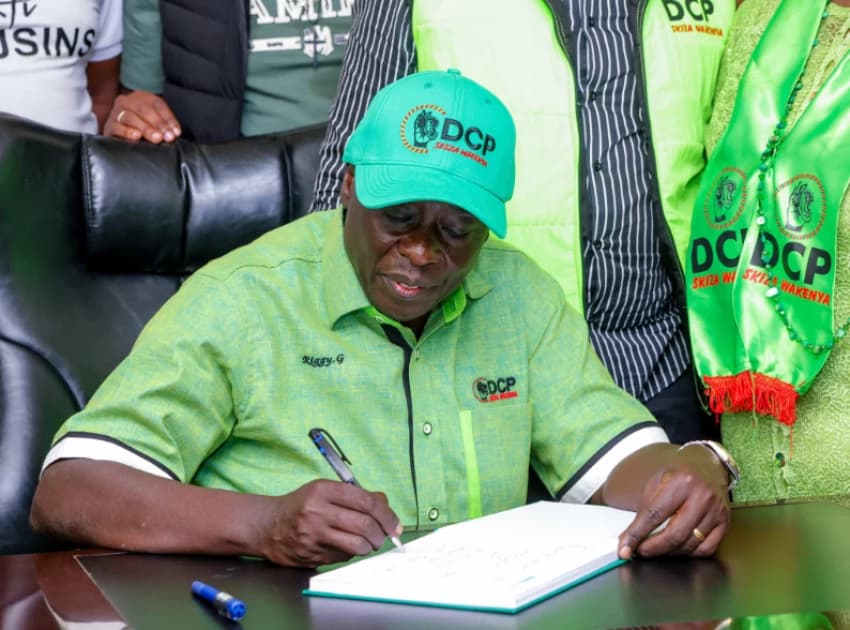We're loading the full news article for you. This includes the article content, images, author information, and related articles.
Former Deputy President Rigathi Gachagua claims President William Ruto intimidated a Democracy For Citizens Party (DCP) aspirant into withdrawing from the Banisa parliamentary by-election, raising questions about political interference.

Former Deputy President Rigathi Gachagua has accused President William Ruto of coercing a Democracy For Citizens Party (DCP) candidate to withdraw from the Banisa parliamentary by-election. Speaking in Nairobi on Friday, October 3, 2025, Gachagua alleged that the candidate, whom he described as strong, was summoned and threatened by President Ruto, leading to their withdrawal from the race.
The allegations by Gachagua come amidst heightened political activity and jostling for influence within the Kenyan political landscape. The Banisa parliamentary seat became vacant following the nullification of the previous election results by the courts. The by-election is seen as a critical contest, with various political parties vying for control and demonstrating their electoral strength. Gachagua's claims, if substantiated, could significantly impact public perception of political fairness and democratic processes in Kenya.
Kenya's electoral laws, primarily enshrined in the Elections Act, prohibit any form of intimidation or undue influence on candidates or voters. The Independent Electoral and Boundaries Commission (IEBC) is mandated to ensure free and fair elections, free from coercion. Any allegations of threats or forced withdrawals are serious and could lead to investigations and potential legal action if evidence supports such claims. The Political Parties Act also outlines codes of conduct for political parties and their leaders, emphasizing adherence to democratic principles.
Political analysts suggest that these developments could influence near-term public debate and policy execution. Stakeholders, including civil society organizations and electoral observers, are likely to urge clarity on the timelines, costs, and safeguards surrounding the by-election process. The allegations could also fuel political tensions between factions within the ruling coalition and the opposition, potentially affecting legislative agendas and national unity. The credibility of the electoral process could also be called into question, necessitating a robust response from electoral bodies and government institutions.
The primary risk associated with such allegations is the erosion of public trust in democratic institutions and the electoral process. If candidates can be coerced into withdrawing, it undermines the principle of free and fair competition. This could lead to voter apathy, increased political instability, and a perception of an uneven playing field. For the ruling party, such claims could damage its reputation for upholding democratic values. For the opposition, it could provide ammunition for criticism and calls for electoral reforms.
The identity of the specific DCP candidate who allegedly withdrew from the Banisa race has not been publicly disclosed. Furthermore, President Ruto's office has not yet issued a statement in response to Gachagua's allegations. The specific nature of the alleged threats and the evidence supporting these claims remain unverified by independent sources.
Observers will be closely watching for a response from President Ruto's office or the State House regarding these serious allegations. The Independent Electoral and Boundaries Commission (IEBC) may also be expected to issue a statement or initiate an investigation into the claims of intimidation. Further details regarding the Banisa by-election, including the final list of candidates and campaign activities, will also be of interest.
The Banisa parliamentary seat by-election is one of several electoral contests anticipated across Kenya following court petitions and nullifications of previous results. These by-elections often serve as litmus tests for political parties' popularity and organizational strength ahead of general elections.
Keep the conversation in one place—threads here stay linked to the story and in the forums.
Sign in to start a discussion
Start a conversation about this story and keep it linked here.
Other hot threads
E-sports and Gaming Community in Kenya
Active 9 months ago
The Role of Technology in Modern Agriculture (AgriTech)
Active 9 months ago
Popular Recreational Activities Across Counties
Active 9 months ago
Investing in Youth Sports Development Programs
Active 9 months ago
Key figures and persons of interest featured in this article